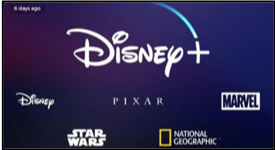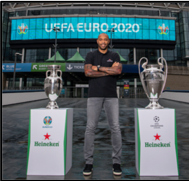The plus factor


In 2006 a pioneering concept in connected sport was launched by Nike. It was an activity tracker device to measure and record the pace of a walk or run more commonly known as Nike+iPod, in partnership with Apple.  The Nike+ Running App followed and other products such as Nike+ Fuelband that were used by 28 million people in 2014. Today, Nike is engaging with more than 100 million consumers via the NikePlus membership program, which has been growing at 30% a year. Clearly, it takes time to develop deep and meaningful relationships, even with your most loyal consumers or fans. The wearables market, including smartwatches, head-mounted displays, ear-worn gadgets and smart clothing is expected to reach $51.54 billion in 2020. Plenty of growth opportunities for Nike and all other sports apparel and lifestyle brands.
The Nike+ Running App followed and other products such as Nike+ Fuelband that were used by 28 million people in 2014. Today, Nike is engaging with more than 100 million consumers via the NikePlus membership program, which has been growing at 30% a year. Clearly, it takes time to develop deep and meaningful relationships, even with your most loyal consumers or fans. The wearables market, including smartwatches, head-mounted displays, ear-worn gadgets and smart clothing is expected to reach $51.54 billion in 2020. Plenty of growth opportunities for Nike and all other sports apparel and lifestyle brands.
On 12th November 2019, Disney launched its new video streaming service Disney+, available in the US, Canada and the Netherlands. 10 million people signed-up one day after the launch. All the more impressive as this is a crowded market and it took Netflix two years to gain its first 10 million subscribers.  To encourage subscribers to sign-up, Disney is offering a free seven day trial followed by $7 per month subscription. In the US, Verizon customers with unlimited data mobile plans receive a year free of Disney+. Shares in Disney closed up 7% adding $18 billion to its market capitalization. The House of Mouse is a brand than influences both minds and markets.
To encourage subscribers to sign-up, Disney is offering a free seven day trial followed by $7 per month subscription. In the US, Verizon customers with unlimited data mobile plans receive a year free of Disney+. Shares in Disney closed up 7% adding $18 billion to its market capitalization. The House of Mouse is a brand than influences both minds and markets.
Salah, Mane and Firmino are synonymous to Liverpool FC fans as Pixar, Marvel and Star Wars are to Disney fans. The famous red playing kit of Liverpool FC has recently been subject to a tug-of-war between New Balance, the existing supplier since 2015 and Nike.  A disagreement was resolved in the courts resulting in Nike supplying the playing kit starting next season. According to media reports, the fee Nike will pay is lower than New Balance, £30 million vs. £45 million but Nike has vowed to sell the Liverpool kit in more than 6,000 stores worldwide. Enough textile has been reserved by Nike to sell 2.9 million kits when the new season starts in 2020.
A disagreement was resolved in the courts resulting in Nike supplying the playing kit starting next season. According to media reports, the fee Nike will pay is lower than New Balance, £30 million vs. £45 million but Nike has vowed to sell the Liverpool kit in more than 6,000 stores worldwide. Enough textile has been reserved by Nike to sell 2.9 million kits when the new season starts in 2020.
For a sport brand that is globally recognized with several hundred million fans and followers, it was surprising to learn that almost 97% of the turnover of Liverpool FC was generated in the UK. Only £15 million of the £455 million in 2017/18 was generated beyond the UK market. No wonder management at the club are keen to expand overseas and hope Nike can play a role engaging with and selling more merchandise to these fans. Hopefully Nike will also partner for 13 years like they did with Manchester United which coincided with one of the most successful periods for the club on and off the pitch. Time will tell.
When it comes to long term partnerships and selling product outside the domestic market,  Heineken is a brand that would be on most shortlists. The existing relationship with UEFA dates back more than 25 years. In addition to serious investments in the Rugby World Cup and Formula 1, Heineken has expanded their football portfolio to include EURO 2020 next to the UEFA Champions League 2021-2024 and Europa Conference League starting in the 2021/22 season, although the latter will be with the Amstel brand. As Heineken replaces Carlsberg at EURO 2020, this marks the end of another long standing partnership which began at EURO 1988. Strangely enough, Carlsberg were also a shirt sponsor with Liverpool from 1992 until 2010, which represented the longest association of a single brand with any football club in English football history.
Heineken is a brand that would be on most shortlists. The existing relationship with UEFA dates back more than 25 years. In addition to serious investments in the Rugby World Cup and Formula 1, Heineken has expanded their football portfolio to include EURO 2020 next to the UEFA Champions League 2021-2024 and Europa Conference League starting in the 2021/22 season, although the latter will be with the Amstel brand. As Heineken replaces Carlsberg at EURO 2020, this marks the end of another long standing partnership which began at EURO 1988. Strangely enough, Carlsberg were also a shirt sponsor with Liverpool from 1992 until 2010, which represented the longest association of a single brand with any football club in English football history.
In a world where millions are thrown around like confetti and short-term metrics such as reach, clicks or shares are used to measure efficiency, it is easy to forget that building sustainable and profitable partnerships takes time. The success of Nike+, Disney+ or Heineken+ did not happen overnight. What is your brand’s plus factor that will add value to your partners, fans and the bottom line?